
In today’s fast-paced world, where processed foods and sugary snacks dominate the market, it’s easy to lose sight of the importance of clean eating. But what exactly is clean eating? And how can it benefit our health and well-being? In this comprehensive guide, we’ll explore the principles of clean eating and provide practical tips on how to incorporate it into your lifestyle seamlessly.
What is Clean Eating?
Clean eating is not a diet; it’s a lifestyle choice focused on consuming whole, minimally processed foods in their most natural state. It’s about nourishing your body with nutrient-rich foods while avoiding artificial additives, preservatives, and refined sugars. Think of it as fueling your body with the highest quality ingredients to optimize health and vitality.
The Benefits of Clean Eating
Embracing a clean eating lifestyle can lead to a myriad of health benefits. From increased energy levels and improved digestion to better weight management and enhanced mental clarity, the advantages are endless. By prioritizing whole foods over processed ones, you’re providing your body with the essential vitamins, minerals, and antioxidants it needs to thrive.
Understanding Whole Foods
Whole foods are foods that are as close to their natural state as possible. This includes fruits, vegetables, whole grains, lean proteins, and healthy fats. These foods are packed with nutrients and free from added sugars, artificial flavors, and chemical additives. Incorporating a variety of whole foods into your diet ensures you’re getting a wide range of nutrients to support overall health.
How to Start Clean Eating
Transitioning to a clean eating lifestyle doesn’t have to be daunting. Start by gradually replacing processed foods with whole alternatives. Swap out sugary snacks for fresh fruits, and trade refined grains for whole grains like quinoa or brown rice. Focus on incorporating more vegetables into your meals and experiment with new recipes to keep things exciting.
Meal Planning and Preparation
Meal planning is key to success when it comes to clean eating. Take the time to plan your meals for the week ahead, making sure to include a balance of protein, carbohydrates, and healthy fats. Batch cooking can also save time during busy weekdays, allowing you to have nutritious meals ready to go when hunger strikes.
Reading Food Labels
When grocery shopping, take the time to read food labels carefully. Look for ingredients you can pronounce and recognize, and avoid products with long lists of additives and preservatives. Pay attention to serving sizes and nutritional information to make informed choices about the foods you’re putting into your body.
Making Healthy Substitutions
Making small changes to your favorite recipes can make a big difference in the healthfulness of your meals. Swap out butter for avocado or olive oil, and use herbs and spices to add flavor instead of salt. Choose whole grain alternatives to refined grains, and opt for natural sweeteners like honey or maple syrup instead of refined sugars.
Staying Consistent
Consistency is key when it comes to clean eating. While it’s okay to indulge occasionally, aim to make healthy choices the majority of the time. Surround yourself with supportive friends and family members who share your goals, and find activities you enjoy that promote a healthy lifestyle.
Overcoming Challenges
Transitioning to a clean eating lifestyle may come with its challenges, but don’t get discouraged. Focus on progress, not perfection, and be kind to yourself along the way. Find healthy coping mechanisms for stress or emotional eating, and seek support from online communities or local groups if needed.
Listening to Your Body
Above all, listen to your body and honor its signals. Pay attention to how different foods make you feel and adjust your diet accordingly. Everyone’s nutritional needs are unique, so experiment with what works best for you and trust your instincts.
Conclusion
In conclusion, clean eating is a simple yet powerful way to nourish your body from the inside out. By prioritizing whole, nutrient-rich foods and avoiding processed junk, you can enjoy better health, increased energy, and a greater sense of well-being. Remember, it’s not about perfection but progress. So start small, stay consistent, and reap the rewards of a cleaner, healthier lifestyle.
Frequently Asked Questions
What exactly is clean eating?
Clean eating involves consuming whole, minimally processed foods in their most natural state while avoiding artificial additives, preservatives, and refined sugars.
Will clean eating help me lose weight?
While weight loss isn’t the primary focus of clean eating, many people find that they naturally shed excess pounds by prioritizing nutrient-rich foods and avoiding processed junk.
Is clean eating expensive?
While some whole foods may be more expensive than processed alternatives, there are plenty of budget-friendly options available. Focus on buying seasonal produce, buying in bulk, and cooking at home to save money.
Can I still enjoy my favorite foods while clean eating?
Absolutely! Clean eating is all about balance and moderation. While it’s important to prioritize whole foods, it’s okay to indulge occasionally in your favorite treats.
How do I know if I’m eating clean?
Listen to your body! Pay attention to how different foods make you feel physically and mentally. If you feel energized, satisfied, and nourished after a meal, chances are you’re eating clean.

